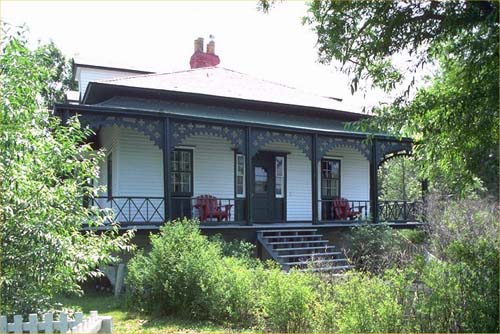Other Name(s)
Hawthorne Cottage National Historic Site of Canada
Hawthorne Cottage
Cottage Hawthorne
Links and documents
Construction Date(s)
1830/01/01
Listed on the Canadian Register:
2005/03/16
 Statement of Significance
Statement of Significance
Description of Historic Place
Hawthorne Cottage National Historic Site of Canada is a picturesque, one-and-a-half storey wooden cottage with a wrap-around verandah. Set in the middle of a wooded lot in Brigus, Newfoundland, the house is noted both for its architectural style and as the former home of Bob Bartlett, captain of several notable Arctic expeditions in the early 20th century. The site was donated to the Canadian people in 1987 and is now maintained by Parks Canada as a historic house museum. The designation refers to the house, some contents, and the landscaped lot.
Heritage Value
Hawthorne Cottage was designated a national historic site of Canada because:
- this cottage, in the Picturesque mode, provides a good example of a gentleman’s modest suburban residence in 1830s eastern British North America;
- It was the Brigus home of Captain Bob Bartlett, captain on a number of Arctic expeditions; and
- the interior furnishings are of particular value.
The heritage value of the site resides in its association with Captain Bob Bartlett and in its picturesque architecture. Built in 1830 for merchant John Leamon on his country estate, Cochranedale, the house was moved overland some ten kilometers to a lot in Brigus during the winter of 1833-1834. Between 1885 and 1946, it was the Brigus home of Robert Abram (Bob) Bartlett (1875-1946), designated a person of national historic significance because of his role in several Arctic expeditions. The house was acquired by Parks Canada in 1987, restored and opened to the public in 1995.
Source: Historic Sites and Monuments Board of Canada, Minutes, June 1978; Fall 2003.
Character-Defining Elements
Key elements of this site include:
- the features of the lot which support the Picturesque qualities of the site, including its generous size, the informal layout with evidence of the original open lawn and plantings of both an ornamental and functional nature such as flower and vegetable gardens;
- surviving original vegetation, particularly the hawthorne trees;
- evidence of an originally enclosed lot such the fence;
- archaeological evidence of former working elements such as a well house, barn, chicken run, dairy/ice house and privies;
- the placement of the house in the middle of the lot;
- the Picturesque qualities of the house as a cottage orné, including the square massing under a shallow hipped roof with dormer windows, its wooden construction and clapboard cladding, its symmetrically organized facade with central entry, its deep verandah on three sides with bellcast roof and decorative wooden fretwork, and its generous bay and French windows;
- evidence of the original interior centre-hall layout and finishes;
- the house furnishings associated with its 19th- and 20th-century domestic use.
 Recognition
Recognition
Jurisdiction
Federal
Recognition Authority
Government of Canada
Recognition Statute
Historic Sites and Monuments Act
Recognition Type
National Historic Site of Canada
Recognition Date
1978/06/19
 Historical Information
Historical Information
Significant Date(s)
1885/01/01 to 1946/01/01
1987/01/01 to 1995/01/01
Theme - Category and Type
- Expressing Intellectual and Cultural Life
- Architecture and Design
- Developing Economies
- Labour
Function - Category and Type
Current
Historic
- Residence
- Single Dwelling
Architect / Designer
n/a
Builder
n/a
 Additional Information
Additional Information
Location of Supporting Documentation
Indigenous Affairs and Cultural Heritage Directorate Documentation Centre 3rd Floor, room 366 30 Victoria Street Gatineau, Québec J8X 0B3
Cross-Reference to Collection
Fed/Prov/Terr Identifier
216
Status
Published
Related Places

Hawthorne Cottage
Hawthorne Cottage, also known as Hawthorne Cottage National Historic Site of Canada, is a rare example of the cottage orné Picturesque style, which flourished in Newfoundland at…